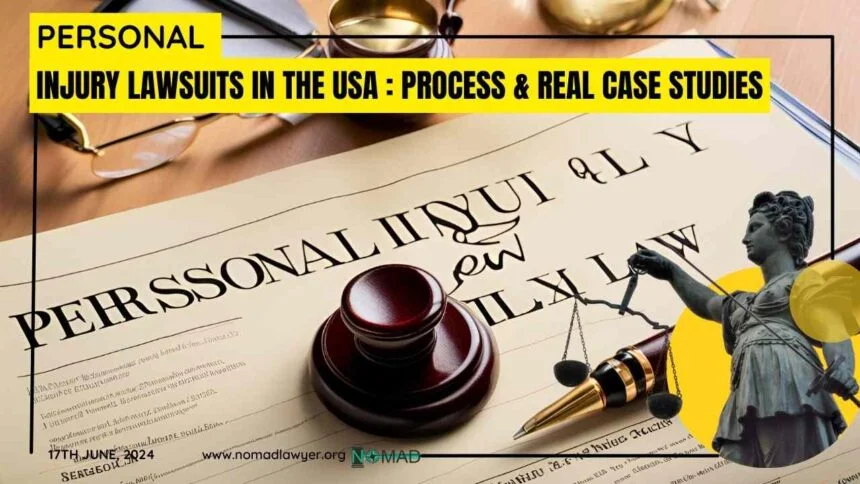You are living your life as usual when suddenly an accident happens. Personal injuries can be painful & life-changing, whether it’s a bike/car accident, slip and fall, or a defective product that causes harm. Navigating the legal terrain of personal injury lawsuits in the USA can be overwhelming, but with the correct information, you can get the compensation you deserve.
In this post, I will explain the ins and outs of personal injury lawsuits using the Philips CPAP lawsuit as a real-life example to help you know what to expect and how to proceed.
Philips CPAP Lawsuit Settlements
| Year | Event | Details |
|---|---|---|
| 2021 | Initial Recall | Over 700 lawsuits were filed, including injury and economic damage claims. |
| 2023 | Lawsuit Filings | Bellwether trials are scheduled, focusing on the most severe cases. |
| 2024 | Settlement Updates | $1.1 billion set aside by Philips for settlements. |
| 2024 | Court Proceedings | Bellwether trials scheduled, focusing on the most severe cases. |
What is Personal Injury Law?
Personal injury law is when someone else hurts you. You can sue in state or federal court. As the plaintiff, you seek money from the defendants – individuals, companies, or entities that caused your injuries.
Personal injury lawsuits occur when someone is harmed by another’s negligence or intentional acts. These cases are complicated with multiple types of injuries, legal principles, and procedural requirements. Here are some of the challenges:
- Proving Negligence: Show that the defendant’s actions caused your injury.
- Medical Evidence: Get medical records and expert testimony to support your claim.
- Time Limits: Meet statutes of limitations and other deadlines.
- Settlement vs. Trial: Do I accept the settlement offer or go to trial?
Real-Life Impact of Personal Injury
Case Study 1: Hit by a Texting Driver (with Real Numbers!)
In 2023 John Smith (plaintiff) was hit by a car while he had the right of way crossing the street. Mary Jones (defendant) was texting and ran the red light. John broke his leg and had severe whiplash. His medical bills were $35,000 and he lost $20,000 in wages.
John’s lawyer presented the evidence – police reports, witness statements, and medical records – to show Mary was negligent. The case went to trial and the jury awarded John:
- $35,000
- $20,000
- $50,000
Total: $105,000 – This is what you can get.
Case Study 2: Philips CPAP Lawsuit
One of the biggest personal injury cases in recent times is the Philips CPAP machines. Philips Respironics recalled millions of CPAP, BiPAP, and ventilator devices due to the risk of inhaling or swallowing degraded foam particles which can cause serious health issues like cancer and respiratory problems.
- Timeline: Recall started in June 2021, ongoing in 2024. Philips has set aside $1.1 billion for settlements.
- Health Issues: Users reported headaches, asthma, and cancers including lung and esophageal cancer.
- Lawsuits: As of June 2024 there are many pending cases, some in settlement discussions.
Types of Damages in a Personal Injury Case (It’s Not Just Medical Bills)
Medical bills are a big part of it, but personal injury cases can recover:
- Medical Expenses: Past, present, and future medical bills for your injury.
- Lost Wages: You couldn’t earn because of your injury and recovery.
- Loss of Earning Capacity: If your injury permanently affects your ability to work and earn a living.
- Pain and Suffering: Compensation for the physical and emotional pain caused by your injury.
- Property Damage: Reimbursement for any property damaged in the accident (e.g. your car).
Damages will vary based on your injuries and your case.
Solution: Personal Injury Claim

If you are a Philips CPAP victim here’s what to do:
1. Get Medical Attention:
Your health first. Document all injuries and follow your doctor’s advice.
2. Talk to a Personal Injury Lawyer
An experienced lawyer will help you understand your rights and the process. They will help you get evidence and file your claim.
3. Get Evidence
Get all documents, medical records, accident reports, and correspondence with the defendant or their insurance company.
4. File the Claim
Your lawyer will fill out the necessary paperwork to start your lawsuit. Make sure all deadlines are met to avoid losing your case.
5. Settlement Talks
Most personal injury cases are settled. Your lawyer will talk to the defendant’s lawyer to get a fair settlement.
6. Trial (If Necessary)
If a settlement can’t be reached your case will go to trial. Your lawyer will present your evidence and argue your case to a judge or jury.
The Personal Injury Lawsuit Process: What to Expect (It’s a Marathon, Not a Sprint)
The personal injury lawsuit process is long and complicated but here’s the short version:
- Consultation: Talk to a personal injury lawyer to see if you have a case.
- Investigation: Your lawyer gets the evidence (medical records, police reports, witness statements) for your case.
- Demand Letter: Your lawyer sends a formal demand letter to the defendant’s insurance company outlining your claim and damages.
- Negotiation: Often settlements are reached through negotiation with the insurance company.
- Litigation: If negotiations fail, your case goes to court for a judge or jury to decide.
FAQs: Personal Injury Lawsuits
What is a personal injury lawsuit?
A personal injury lawsuit is when someone sues another person for harm caused by their negligence or intentional actions.
How long do I have to file a personal injury lawsuit?
Time limits vary by state and type of injury but usually 1-6 years. Get a lawyer ASAP.
Do I need a lawyer to file a personal injury lawsuit?
Not required but highly recommended. They can handle the legal system and negotiate for you.
What is the average settlement for a personal injury lawsuit?
Settlements vary greatly depending on the injury, defendant’s liability, and other factors. $1000 to $1 million+.
Bottom Line
Personal injuries are tough but knowing the process and what to expect helps. The Philips CPAP lawsuit shows you need to hold companies accountable and get justice for the harm. Follow these steps and get a lawyer and you’ll get what you’re owed and can move on.




